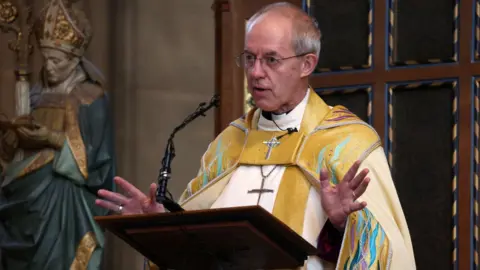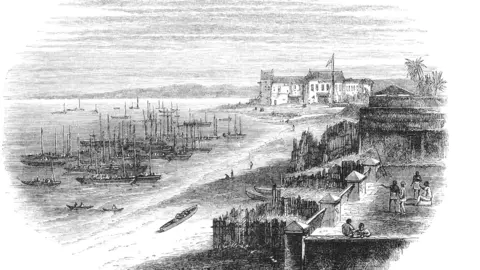Archbishop of Canterbury apologises over Church fund's link to slavery
 Getty Images
Getty ImagesThe Archbishop of Canterbury has apologised after research showed the Church of England's investment fund has links to the slave trade.
The investigation, initiated by the Church Commissioners, a charity managing the Church's investment portfolio, revealed that for more than 100 years the fund invested large sums of money in a company responsible for transporting slaves.
The fund, known in the 18th century as Queen Anne's Bounty, has now developed into a £10.1bn investment trust.
The Most Reverend Justin Welby said he was "deeply sorry for the links".
Queen Anne's Bounty was formed in 1704 to help support poor clergy.
An examination of its accounts in 1739 showed £204,000 (estimated to be worth £443m today) had been invested in the South Sea Company.
The South Sea Company had an exclusive contract to transport slaves from Africa to Spanish colonies in South America for more than 30 years from the 1710s.
It shipped tens of thousands of slaves, with the research suggesting that an estimated 15% of them died en route.
Church investments in the South Sea Company continued well into the 19th century.
The archbishop said: "This abominable trade took men, women and children created in God's image and stripped them of their dignity and freedom.
"The fact that some within the Church actively supported and profited from it is a source of shame.
"It is only by facing this painful reality that we can take steps towards genuine healing and reconciliation - the path that Jesus Christ calls us to walk."

Analysis
On the one hand, the Church of England has celebrated its hand in helping bring about an end to slavery, citing the role played by Anglican Evangelical, William Wilberforce. On the other, it has had to acknowledge more and more the extent to which it profited from slavery.
In recent years, the Church has apologised for dozens of its clergymen having been revealed to have owned slaves. It has said sorry because its missionary organisation, The Society for the Propagation of the Gospel, owned a plantation in Barbados, branding its slaves across the chest with the word SOCIETY.
Now by its own research, it has acknowledged that for decades its investment fund poured almost all its money - aside from what it used to buy land - into a company that had a monopoly on transporting slaves to South America.
With more than half of the worldwide Anglican communion now based in Africa, these admissions will be made all the more uncomfortable.
The Church of England initiated this investigation with a view to being more open about its historic dealings and says a group will now be convened to decide what its response should be. But a spokesperson would not be drawn on whether that meant more than further statements and prayers, or whether it would include discussions about financial reparations.

The research also found that the fund received numerous contributions from individuals linked to, or who profited from, transatlantic slavery and the plantation economy.
The archbishop added: "I pray for those affected by this news and hope that we may work together to discern a new way forward."
The Bishop of Birmingham, the Right Reverend David Urquhart, a member of the Church Commissioners' board and chair of the group overseeing the research, said the body would use the knowledge learned from the investigation to ensure its was at the "forefront of responsible investment globally".
 Getty Images
Getty ImagesAdditional reporting by Andre Rhoden-Paul
